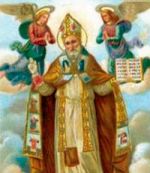Christmas Gifts Are a Reminder of Jesus
Dear Friends,
This year too, I have the welcome opportunity of meeting the Roman university world and of exchanging greetings with you for Holy Christmas, which is now at hand. I greet Cardinal Camillo Ruini who has presided at the Eucharistic celebration and guided you in reflection on the liturgical texts. I next thank the Rector of the Rome III University and the young student, both of whom have spoken on behalf of your learned assembly. I offer my affectionate greeting to each and every one.
We are meeting just before Christmas, which is the feast of gifts, as I recalled last Sunday when I visited the new Roman parish dedicated to Our Lady Star of Evangelization. Christmas gifts evoke the gift par excellence which the Son of God made of himself and offered to us in the Incarnation.
For this reason, Christmas is appropriately emphasized by the many gifts that people give to one another in these days. But it is important that the principal Gift of which all other gifts are a symbol not be forgotten. Christmas is the day on which God gave himself to humanity, and in the Eucharist this gift of his becomes, so to speak, perfect.
Under the appearance of a little piece of bread, as I said to the children of the above-mentioned Roman parish who are preparing for First Communion and Confirmation, it is really Jesus who gives himself and wishes to enter our hearts.
Dear young people, this year you are reflecting precisely on the theme of the Eucharist, as you follow the spiritual and pastoral programme prepared by the Diocese of Rome.
The Eucharistic mystery is the privileged point of convergence between the various contexts of Christian life, including that of intellectual research.
Encountered in the liturgy and contemplated in adoration, Jesus in the Eucharist is like a "prism" through which one can penetrate further into reality, in the ascetic and mystical, the intellectual and speculative, as well as the historical and moral perspectives.
In the Eucharist, Christ is really present and Holy Mass is a living memorial of his Pasch. The Blessed Sacrament is the qualitative centre of the cosmos and of history. Therefore, it constitutes an inexhaustible source of thought and action for anyone who sets out to seek the truth and desires to cooperate with it.
It is, so to speak, a "concentrate" of truth and love. It not only illumines human knowledge, but also and above all human action and human life, in accordance with "the truth in love" (Eph 4: 15), as St Paul said, in the daily task of acting as Jesus himself did.
Thus, the Eucharist fosters in those who nourish themselves on it with perseverance and faith a fruitful unity between contemplation and action.
Dear friends, let us enter into the mystery of Christmas, now approaching, through the "door" of the Eucharist; in the grotto of Bethlehem let us adore the Lord himself who, in the Sacrament of the Eucharist, desired to make himself our spiritual food to transform the world from within, starting with the human heart.
I know that for many of you, university students of Rome, it is now a custom at the beginning of the academic year to go on a special diocesan pilgrimage to Assisi, and I know that many of you took part in the recent one, too.
Well, were not St Francis and St Clare both "conquered" by the Eucharistic Mystery? In the Eucharist they experienced the love of God, that same love which, in the Incarnation, impelled the Creator of the world to make himself little, indeed, the smallest one and the servant of all.
Dear friends, as you prepare for Holy Christmas, may you nourish the same sentiments as these great Saints, so beloved by the Italian People. Like them, fix your gaze on the Child wrapped in swaddling clothes and laid in a manger (cf. Lk 2: 7, 12, 16).
Learn from the Virgin Mary, the first person to contemplate the humanity of the Incarnate Word, the humanity of Divine Wisdom. In the Baby Jesus, with whom she had infinite and silent conversations, she recognized the human Face of God, so that the mysterious Wisdom of the Son was impressed on the Mother's mind and heart.
So it was that Mary became the "Seat of Wisdom", and with this title is venerated in particular by the Roman Academic Community.
A special Icon is dedicated to the Sedes Sapientiae. From Rome it has already visited various countries on a pilgrimage to university institutions. It is present here today, so that it may be passed on from the delegation which has come here from Bulgaria to the one which has come from Albania.
I greet with affection the representatives of both these Nations and express the wish that per Mariam their respective academic communities may advance ever further in their search for truth and goodness, in the light of Divine Wisdom.
I warmly address this wish to each one of you present here and I accompany it with a special Blessing which I willingly extend to all your loved ones. Merry Christmas!
© Copyright 2006 - Libreria Editrice Vaticana
This item 7364 digitally provided courtesy of CatholicCulture.org






